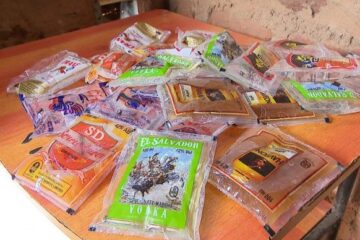Health professionals seek drug-free society

A photograph shows collected cough syrups in Banjul on October 06, 2022. - Indian authorities are investigating cough syrups made by a local pharmaceutical company after the World Health Organisation said they could be responsible for the deaths of 66 children in The Gambia. (Photo by MILAN BERCKMANS / AFP) (Photo by MILAN BERCKMANS/AFP via Getty Images)
Prominent health professionals in Nigeria have said tackling of drugs misuse must include multidimensional approach that can lead to creating a drug free society.
The Managing Director of Serenity Royale Hospital, Dr Kunle Adesina, Dr Abubakar Salami, Dr Sam Abah, Hajiya Salamatu Farouq Salamatu and David Folaranmi agreed on this at the “Fly Above the High Conference” in Abuja with the theme, ‘Multi-dimensional approach to creating a drug-free society.’
In the lectures papers Adesina said the effect of addiction is rarely limited to the person with the addiction but everyone around him or her is affected in some way.
Adesina cited a report by the United Nations Office on Drug and Crime in Nigeria which indicates that, “14.4% (14.3 million) of people aged between 15- and 64-years abuse drugs.
He said, “It is estimated that more than eight million children younger than age 18 live with at least one adult who has a SUD that is a rate of more than one in 10 children
“The majority of these children are younger than age 5 (U.S. Department of Health and Human Services [USDHHS], 2010) on parental drug use which is considered the chronic misuse of substances by a parent or care-giver in charge of a child.
“A large body of evidence spanning several decades has documented that the children of parents who abuse alcohol, tobacco, and drugs (henceforth collectively referred to as parental substance abuse) are more likely to develop a variety of emotional, behavioral, physical, cognitive, academic, and social problems in the future.
On how to achieve a drug free society, Adesina said, “Addiction affects every member of the family and so treatment should not only be focused on the sufferer but every member of the family, and the family members needs therapy and intervention as much as the addict.”
Also speaking on the “Role of family in drug demand reduction”, Farouq Salamatu said the incidences of drug consumption and abuse was alarming, adding that the development should be of utmost concern to all within the Nigeria society and humanity in general.
She maintained that the family unit is the most important stakeholder in the quest for drug demand reduction, adding that drug demand reduction is the strategy and measures aimed at discouraging, preventing and reducing the public desire for illegal and illicit drugs sales and consumption.
Yahaya said “Spouses, parents, brothers, sisters, and extended family members are all stakeholders and must put in efforts and measures to counter the menace of illicit drug sales and use.
“The first strategy to drug demand reduction is to have an appropriate mindset. A lot of families see drug demand reduction as: “not our concern, business or responsibility.
With a dissociative mindset, families are unable to see their all-important role in drug demand reduction.
Speaking on the way forward, Yahaya said, “Manufacturers and distributors of illicit drugs and other related substances are part and parcel of our society. They are in some cases family and friends that we know and relate with.
“All families should look beyond the immediate self and become active participants in drug demand reduction by taking up the civic responsibility of reporting persons involved in either production, distribution or consumption of illicit drugs to the appropriate authority.”
In his own lecture Abah said that drug use of any type activates the same circuits as do behaviours linked to survival and pleasure, such as eating, bonding and sex.
He said, “With repeated drug exposure, the brain may adapt to the presence of the substance, leading to tolerance, where higher doses of the drug are required to achieve the desired effects. Chronic drug use can lead to physical dependence, characterized by withdrawal symptoms when the drug is discontinued,” Abah added.











